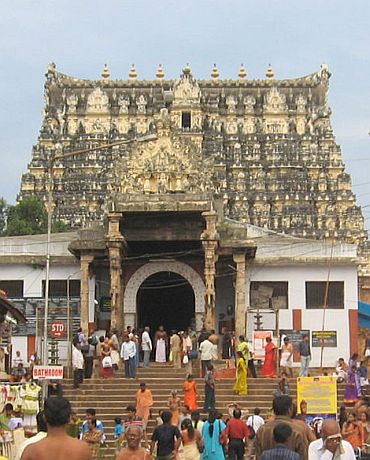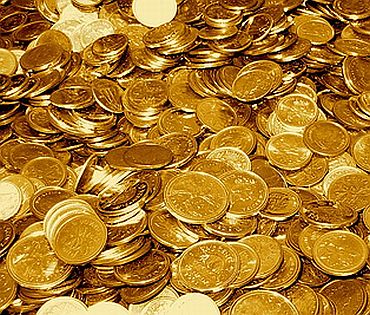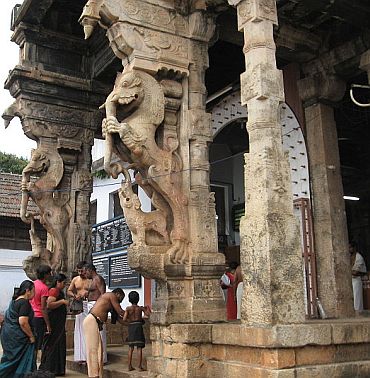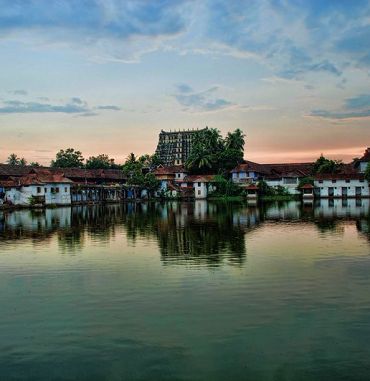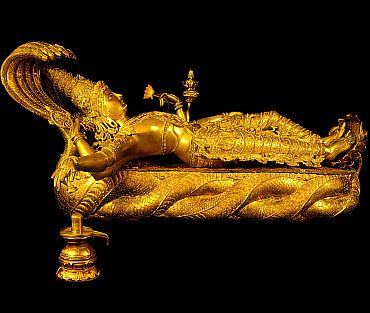 | « Back to article | Print this article |
Rs 90,000 cr in Padmanabhaswamy temple. What next?
As the treasure chests open in Sree Padmanabhaswamy temple, debate sparks on how to safeguard the treasure considering its immense historical and cultural values
Even as priceless treasures found from cellars of Sree Padmanabhaswamy temple in Kerala is estimated to be around Rs 90,000 crore, the discovery has sparked a debate on how to protect and preserve the royal legacy which has surpassed everyone's imagination.
Opening of the long-locked chambers, on Supreme Court orders, which began on June 27 has so far revealed a large number of gold ornaments, gold and silver coins, stone studded crowns, idols and figurines inlaid with precious stones and jewels.
The exercise to assess the value of the articles, undertaken by a seven-member panel of observers, including two former high court judges, continues on Monday after a day's breather on Sunday.
Click on NEXT to read further...
Rs 90,000 cr in Padmanabhaswamy temple. What next?
Emergence of the temple as one of the richest Hindu shrines in the world has also thrown up security concerns with police as an interim step deploying two platoons of armed personnel.
According to the temple sources, the treasure trove has been so far estimated at around Rs 90,000 crore.
The question nagging historians, academics and enthusiasts of temple culture, however, is how to safeguard the treasure considering its immense historical and cultural values.
Many of them say the treasure symbolised the honesty and simplicity of erstwhile Travancore kings, who did not take away a single item from the pile whose existence they were aware of.
Rs 90,000 cr in Padmanabhaswamy temple. What next?
While similar treasures possessed by many other princely states in pre-colonial India were plundered by attackers, or wasted on luxuries by members of the royal houses themselves, the Travancore kings have zealously guarded them as reserves of the state, they said.
Narayanan, former Indian History Congress President said utmost care and thought should be given to protect the treasures.
"The state or Central government cannot take over these assets as they are part of the temple coffers according to the system followed by the Travancore kings," he said.
Rs 90,000 cr in Padmanabhaswamy temple. What next?
"We have the examples of many temples before us which have been taken over by the government and later plunged into mismanagement and irregularities. It should not happen to this shrine also," he said.
"In my view, a temple museum can be set up and some selected articles, recovered from the cellars, can be catalogued and exhibited. Other articles should be kept in a safer place."
Rs 90,000 cr in Padmanabhaswamy temple. What next?
Historian and writer M G Sasibhushan opined that the rare treasures, kept for centuries in the secret chambers of the shrine, should be preserved for future generations.
Coins from other princely states like Vijayanagar empire and European countries have also been found which might be part of the gifts received by the rulers of the time.
The coins also reflect on the revenue received by the royal state through its maritime spice trade.
Rs 90,000 cr in Padmanabhaswamy temple. What next?
While all major temples of the area were handed over to the Travancore Devaswom Board after merger of the princely state with the Indian Union after 1947, control of the Padmanabhaswamy temple was retained by the royal house through a covenant with the government.
Though the last royal ruler Sree Chithira Tirunal Balarama Varma left the entire treasure untouched he was made 'Rajapramukh' (status equivalent to Governor) after the merger.
Meanwhile, outfits like VHP and community organizations like Nair Service Society and Sree Naryanad Dharma Paripalana Yogam have warned against any attempt on the part of the state to take over the treasure and wanted them to be declared as the temple asset.
